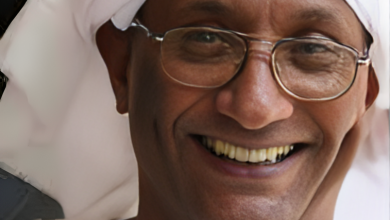Goodbye Haj Al-Amin

By: Al-Mahboob Abdul Salam
Among the ironies of these strange, sad days of ours is that Al-Amin Ali Khalifa passed away in a strange exile far from his family home in Burri, and that the Batahin tribes, the Jammu’iyah and others would not rushed for his funeral, and that the leaders of the Muslim Brothers, the Ansar, the Khatmiyya, the Unionists, and the Communists would not flock to his headquarters, and that the Fourth Station market would not close its doors, and that neighborhoods of Shambat, Tuti, Halfaya, Soba, Khartoum outskirts would not flock towards Dara’issa. How could his loved ones not come from all the cities from Sennar to Amman and from Nyala to Halfa, and for the minarets of Khartoum not to rise with mourning and prayers and not to be buried in Sudan?
This is because Haj Al-Amin was a complete, integrated, and self-contained society. Although he was one of the first generation of the Islamic movement in the Khartoum region, he imprinted his organizational commitment with his own brand and poured out his traits and morals on his group and influenced them more than they influenced him. He was a true Sudanese whose Sudanism was not marred by any taint or taint. It was marred by situations or calamities, and the spaciousness of his home, which he made a destination, as the Qur’an commanded, was like the spaciousness of his morals, which did not differentiate between his citizens. He met them all with good news and welcome, and most importantly, he met them with sincere advice. There is no doubt that he was the destination of everyone and the place of their trust, and despite the fact that he did not obtain any modern education, God has given him wisdom, and whoever is given wisdom has been given much good. He spends time with people like us discussing politics, organization, and thought, until his family, even the farmers, enters with him to talk about agriculture, seasons, crops, and the eight livestock, “two of them cows and two of them sheep”. Then, soon enough, the senior leaders of the government and the movement interrupt our council and visit him. At any time they check on him or ask him about a piece of land, the purchase of a house, the exchange of a farm, or the marriage of a girl or boy, and if the house is quiet due to visitors, and it only stays quiet for a few hours, Haj Al-Amin told us about what Khartoum was like half a century ago, and he begins listing the names of its notables, merchants, and prices of goods and crops, and their stories and paradoxes, and everything that that quiet time carried, which did not witness violent migrations and was not occupied by wars, famines, and epidemics. Rather, the city received all of this in tranquility and mixed it with creativity, and since the Cairo cemeteries contained the body of Hajj Al-Amin, and God destined that this brilliant page be turned there. An entire record of social history passed with him, and one of its writers was lost forever.
Since I was one of the fortunate people who knew Hajj Al-Amin and formed a strong friendship with him, I was not at a loss whenever I or one of them decided to meet me in Khartoum, so I would make an appointment for him at his home. Whenever the hour of the day or night came, we would go to the house “which is the Qiblah”, without needing to notify him or notify one of his sons, or you exhaust yourself searching for his grandchildren on the phone so that they can prepare a place for the visitor. Rather, it is an open door that you do not knock on and whose bells do not ring, but through the doors you entered, you found someone who welcomed you and showed you to the gathering and served you with generous hospitality. You might find Haj Al-Amin himself and felt comfortable with him until he got to know your guest and spoke to him about his people, his region, and everything about its past and present. One of his civilized behavior and rare characteristics was that he did not differentiate between people and did not stop at the barriers of age or color. Rather, he immersed himself in the conversation and amazes you with his opinion, which he did not strive to express, but rather broadcast it spontaneously, without effort, adorned with wisdom and governed by experience. Hajj Al-Amin was one of the rare group described by Al-Jahiz, who said that ideas were sparked in their hearts and purified by their innate intelligence.
I also formed a special friendship with all of his children and we shared a long friendship, and we often agreed on the problems that God afflicted us with regarding the problems of our movement in particular and the general problems of the nation. We often quarreled, and Haj al-Amin often listened to our conversations and ongoing discussion in silence and calm before he expressed his opinion as if it were the final word, and often. He does not turn away from us just as the elderly turn away from the frivolity of the young. God endowed him with peace of mind, hardly disturbed by any situation or incident. Among his many distinguished positions is that he did not recognize the rifts of the famous Sudanese Islamic movement at the end of the century, and he continued to visit its parties and meet them as he continued to meet them for decades, and they all continued one after the other. He maintained his home as was their custom from ancient times, and he did not reduce any of the photographs that his sons hung on the walls of the guest salon. Rather, most of the visitors continued to marvel at the wall that brought together enemy brothers and admired the rare Eminence of Haj Al-Amin, for he was first-class, very honest, and did not mean his commitment to the Islam movement. Except to serve Islam, and he did not aspire to any of its enjoyment or prestige, not even to be a politician.
The war expelled Al-Amin Ali Khalifa from his home and his country, and the comprehensive aggression broke his resolve not to leave his home and his country. He was forced to leave without doing any wrong, and he is an unyielding man who has conquered death more than once, and has been in hospitals, entering and leaving them in a few days, returning to his home, his family, his visitors, and his friends. He resumed his life as if nothing had happened. After he left attackers occupied his home and assassinated his grandson who was the one who stayed with him the most and perhaps the closest to his heart, as he told me after he got the news. He did nothing more than praise him as a brave knight who would not stop giving in his valor and generosity, and he was truly as he described him.
The cemeteries of Cairo contained his remains, and he was the one who used to visit them and the feeling of passing by did not leave him. I visited with him its markets and shops, and he was only occupied with what occupied the spaces of the mosques that he built in more than one place and what he used to improve their affairs and decorate their walls with verses and wise remembrance. Haj Al-Amin passed away and it continued to remind me of the narrator’s grandfather in the season of migration, not like an oak in the forests of Europe that nature has blessed with fertility and growth, but like a seedling tree in the heights of Batahin, with deep roots and delicate leaves that resists death because it does not waste life.
May God have mercy on Haj Al-Amin, for he spent the blessed days of the holy month of Ramadan, as if he waited for Friday dawn to surrender his soul, reassured and in peace, as he had lived.



